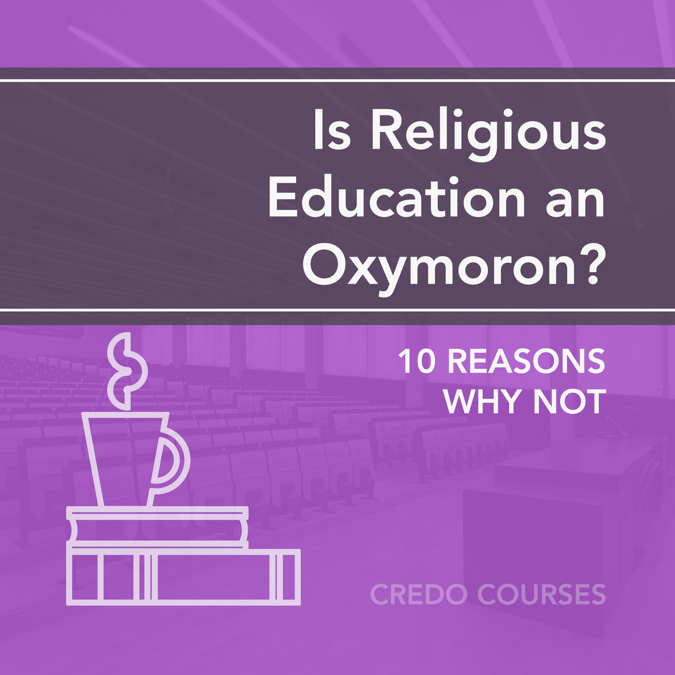
Do you have a favorite oxymoron? Many of us do. Some oxymorons are at the expense of someone else. Some are just plain funny (e.g. jumbo shrimp). Some oxymorons reveal cultural biases or trends in thinking we unconsciously adopt.
Religious Education and Military Intelligence
Using “Christian education” as an oxymoron is like using “military intelligence” as an oxymoron. In both cases they’re done at the expense of their respective groups. What order sleep clonazepam drug online society considers to be an oxymoron reveals cultural bias.
[Tweet “Using “Christian education” as an oxymoron is like using “military intelligence” as an oxymoron.”]

1. Religious Schools Educate Millions Annually
Over 4 million students (about 1 in 12) attend religious schools[1]. This number may be a low estimate. According to the U.S. Dept. of Education, 35.9% of elementary and secondary schools in America are religious[2]. Smaller class sizes make it unlikely that 35.9% of schools represents 35.9% of students. Even so, it’s not an insignificant number.
[Tweet “If Christianity were anti-education, we wouldn’t observe schools (at all levels) being established, operated, or funded by Christians.”]
2. Most Nobel Prize Winners Are Christian
65.4% of Nobel Prize Laureates have identified Christianity as their religious preference[3]. In fact, the Nobel Prize itself was established by a Lutheran, Alfred Nobel. Do these laureates simply divorce their religious preferences from their scholarly pursuits? Perhaps, but if religious education is contradictory, wouldn’t we expect to see a low representation within these noble (homophone pun intended) ranks?
3. There Have Always Been Christian Scientists
Galilei, Kepler, and Pascal were Christians[4]. A long list of Christian scientists and philosophers can be found here. A comprehensive list would fill a book, maybe two. It’s commonly held that scientists (past and present) are usually unbelievers. This is demonstrably not the case. Some argue that the religious beliefs of past scientists were coincidental—mere accidents of historical congruence.
Were scientists in the past Christians because everyone back then was Christian. It’s notoriously difficult to determine the true state of one’s beliefs. This is true even when the person in question is right in front of you. So it must be admitted that some who bear the “Christian” label in the past were likely not Christian at all. I asked Dr. Douglas Groothuis what he thought about this. He denied the caricature. He pointed out that the scientific advances they made were precisely because of their Christian worldview, not in spite of it.
[Tweet “The scientific advances they made were precisely because of their Christian worldview, not in spite of it.”]
4. The Bible Is Pro-Education and Pro-Science
Scripture instructs Christians to study[5]. God values wisdom and knowledge[6]. Knowing Christ and having wisdom go together[7]. Some may claim that the education the Bible recommends is religious in nature. It’s certainly true that the Bible encourages its readers to know what they believe. However, this is not in conflict with education about non-religious topics as well. In fact, some of the greatest philosophers in history have been Christians.
What about science? Isn’t the whole idea of miracles anti-science? Daniel 1:11–16 records the story of some “sons of Israel” who asked to be allowed to maintain a diet different from that of the Nebuchadnezzar. Daniel presents the idea (common enough today) of using a control group and an experiment group. Daniel and his friends would eat their own diet while the other young men would eat the King’s diet. After ten days the results were compared to determine which diet was superior. I won’t give away the ending, but suffice to say, Daniel appealed to the testability of a hypothesis, not to miracles.
5. Harvard+Yale+Princeton Were Founded by Christians
Christians founded three of the five wealthiest universities in the United States: Harvard, Yale, and Princeton[8]. It must be granted that in large part these universities have diverged greatly from the vision of their founders. William F. Buckley’s God & Man at Yale published in 1951 gained fame for its criticism of the way Yale undermined the faith of its Christian students. Modern apostasy aside, the question remains, why would religious people establish an institution of higher education if their worldview devalued education?
Are you starting to see a trend here? It would be one thing if there were simply one or two outliers in religion who championed the cause of education but surely not this many? By now, the chinks in the anti-education assumption should be obvious.
6. The Christian Worldview Is Foundational to Education
Christianity provides a firm philosophical foundation for education. The regularity of nature[9], predictability of cause and effect[10], and the belief that humans can understand the world[11] are Christian beliefs that are necessary to justify the value of education. This is not a claim that those who hold to non-christian worldviews don’t value education. They certainly do. Rather, it is the assertion that non-christian worldviews must borrow intellectual capital from the Christian worldview to make their criticisms.
[Tweet “Non-christian worldviews must borrow intellectual capital from the Christian worldview.”]
7. The Bible Is Pro-Philosophy
The Bible warns against godless philosophy, but philosophy itself is not denigrated[12]. In fact, the entire book of Proverbs elevates wisdom and knowledge to an extremely high degree. The history of philosophy is replete with great Christian thinkers. Even the Apostle Paul was not afraid to argue philosophy with the men in Athens.
8. Christianity Holds that Individual Transformation Is Achieved through the Mind
The Bible states that individual transformation comes through a renewing of the mind[13]. This militates against the view that it is mere moral reformation that accompanies salvation. That’s not to minimize the importance of the ethical revitalization that comes with Christianity, but rather to point out that a Christian isn’t fully obeying God if they doesn’t love God with their mind.
[Tweet “A Christian isn’t fully obeying God if they don’t love God with their mind.”]
9. Christians Founded 70% of the World’s Top Ten Universities
Two of the top five and seven of the top ten ranked universities (as ranked by the Academic Ranking of World Universities) were founded in whole or in part by Christians[14]. This statistic makes a falsehood of the stereotype that Christianity is anti-intellectual, ethically medieval, and culturally backward. There are religions that don’t value education. Christianity isn’t one of them.
[Tweet “Two of the top five and seven of the top ten ranked universities (as ranked by the Academic Ranking of World Universities) were founded in whole or in part by Christians”]
10. The Advance of Western Civilization Owes Much to Christianity
Dr. Craig L. Blomberg in Christian Apologetics states that:
Christianity is responsible for a disproportionately large number of the humanitarian advances in the history of civilization—in education, medicine, law, the fine arts, working for human rights and even in the natural sciences (based on the belief that God designed the universe in an orderly fashion and left clues for people to learn about it)[15].
A worldview which not only allows for but encourages the development of civilization cannot be called anti-educational with a straight face.
- http://www.boston.com/news/globe/editorial_opinion/oped/articles/2004/05/09/making_the_case_for_parochial_schools/ ↩
- United States. Department of Education. National Center for Education Statistics. Characteristics of Private Schools in the United States: Results From the 2011–12 Private School Universe Survey. By Stephen P. Broughman and Nancy L. Swaim. July 2013. Accessed February 27, 2015. http://nces.ed.gov/pubs2013/2013316.pdf. ↩
- Baruch A. Shalev 100 Years of Nobel Prizes (2003), Atlantic Publishers & Distributors , p.57: between 1901 and 2000 reveals that 654 Laureates belong to 28 different religions. Most 65.4% have identified Christianity in its various forms as their religious preference. ↩
- Christian Apologetics 101. Directed by Ted Paul. Performed by Dr. Douglas Groothuis. Edmond: Credo Courses, 2015. DVD. ↩
- The Holy Bible: King James Version, Electronic Edition of the 1900 Authorized Version. (Bellingham, WA: Logos Research Systems, Inc., 2009), 2 Ti 2:15. ↩
- New American Standard Bible: 1995 Update (LaHabra, CA: The Lockman Foundation, 1995), 2 Ch 1:11. ↩
- NASB, Col 3:16. ↩
- CCAP. “22 Richest Schools In America.” Forbes. July 30, 2014. Accessed March 14, 2015. http://www.forbes.com/sites/ccap/2014/07/30/22-richest-schools-in-america/. ↩
- NASB, Ge 8:22. ↩
- The acknowledgment of miracles presumes that cause and effect are normative. ↩
- NASB, Ro 1:21. ↩
- NASB, Col 2:8. ↩
- NASB, Ro 12:2. ↩
- ShanghaiRanking Consultancy. “Academic Ranking of World Universities 2014.” Academic Ranking of World Universities. Accessed March 14, 2015. http://www.shanghairanking.com/ARWU2014.html. ↩
- Craig L. Blomberg, “Chapter 19: Jesus of Nazareth,” in Christian Apologetics: A Comprehensive Case for Biblical Faith (Downers Grove, IL; Nottingham, England: IVP Academic; Apollos, 2011), 438. ↩



Lolwut, now that’s a joke if I ever saw one! Religion is about spreading ignorance while education is supposed to be about alleviating it. It is a clear oxymoron; those folks won a Nobel in spite of their belief in an imaginary sky fairy.
AWWWWWW. She is adorable. I can’t believe she is 4 months old already! My aunt is pregnant with my newest neucow/hepsin (technically cousin but he will call me auntie!). Can’t wait to meet little Jonathan in August. Even though he has Down’s Syndrome, he is perfect. I can’t wait to see Livi grow into a beautiful little girl!